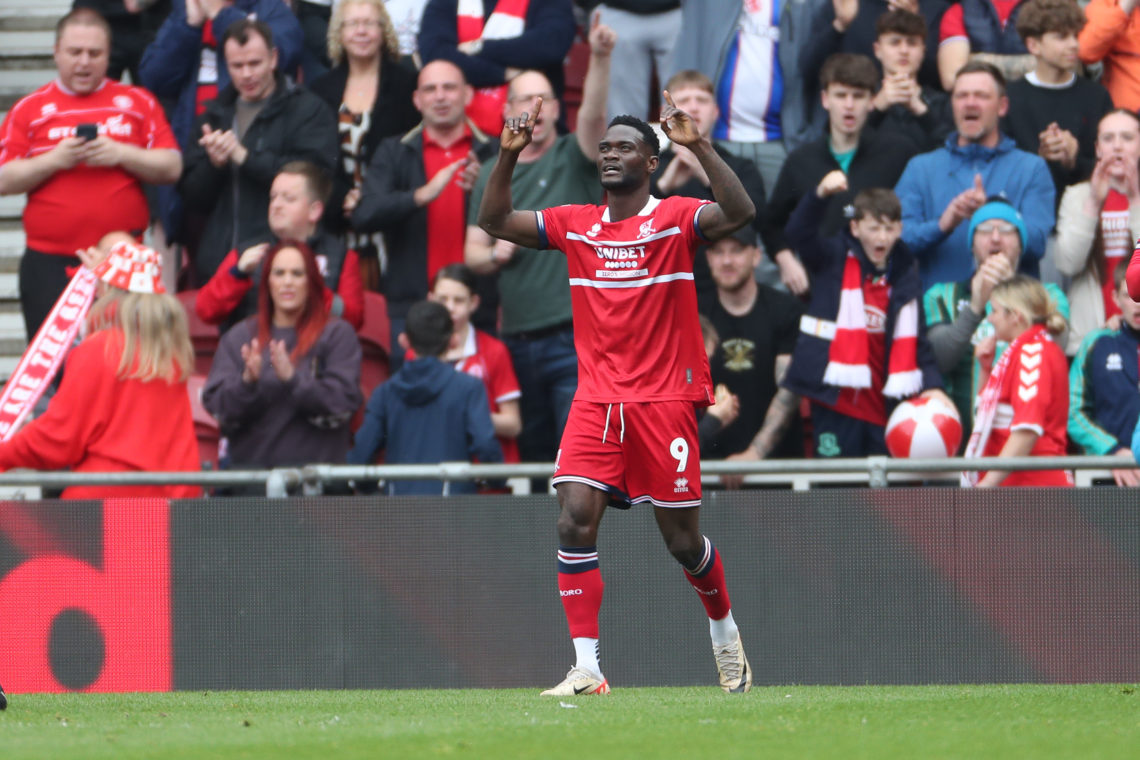Wolves are in the market for another striker, with Middlesbrough’s goal machine Emmanuel Latte Lath popping onto their radar.
Gary O’Neil fixed one huge problem Wolves had last season early on in the summer.
The Wanderers boss was desperate to land a new striker following their woes last term and did so with the arrival of Jorgen Strand Larsen from Celta Vigo.
Strand Larsen fired 13 goals in La Liga last term and has looked promising in pre-season, with the 24-year-old posing a constant threat to opposing defences.
The Norwegian sharpshooter isn’t the only striker they’re looking to sign however, as Middlesbrough’s Emmanuel Latte Lath has taken their fancy.
However, with Boro looking to receive in excess of £20 million for the man who fired 16 Championship goals last term, concerns have been raised over whether Wolves can afford that figure.
- READ MORE: Wolves submit offer for one of Europe’s most promising talents, his agent is Jorge Mendes
How Wolves transfer business has impacted their finances
Wolves have worked miracles during this transfer window. In selling Max Kilman to West Ham for around £40 million, the signings they’ve made in the shape of Pedro Lima, Rodrigo Gomes and Strand Larsen have essentially cost the club nothing.
Matt Hobbs has pulled off a masterstroke in that sense however, Wolves are still operating on a tight budget this summer despite their earlier signings.
A report from the Athletic last month previously explained how the £25 million paid for Strand Larsen would be their most expensive acquisition, with supporters expecting more cost-efficient players to arrive.

To shed further light on the club’s financial situation, finance expert Adam Williams explained how Wolves are in a strong place financially with the sale of Kilman helping balance the books.
Speaking exclusively to Molineux News, TBR’s Head of Football Content, Business, Finance & Governance revealed how their summer signings are amortised over five years, helping them stay in the green financially.
“The losses were almost £70m in 2022-23, and most analysis I’ve seen suggests their losses for 2023-24 will be about £30m,” Williams said.
“You’re allowed to lose £105m over a rolling three-year period under PSR. The headline profit-loss figures never tell the full story, as there are a number of PSR-deductible costs.
“But with a pretty big margin for error, we can confidently say that PSR is a millstone for the club at present. On face value, Wolves’ income exceeds their expenditure this summer by about £10m, which is good news.
“Kilman’s departure will have helped massively as the club paid such a tiny fee for him from Maidenhead. The £40m they have got for him is pure profit in PSR terms.
“By contrast, if they sold, say, Fabio Silva for any less than his book value – which I think is about £14m at the moment, as determined by his initial transfer and the time remaining on his contract – they would actually negatively affect their PSR calculation.
“Yes, the cash from the Kilman sale will be received in instalments. But from a PSR perspective, the signings they have made will also be amortised over five years, so their balance is still very much positive this summer.”
Now, given how Wolves have structured their transfer business in instalments, it means that signing a player such as Latte Lath is very much possible.
- READ MORE: Jorgen Strand Larsen now issues ‘big’ claim that will excite Wolves fans ahead of 2024/25

Wolves finances allow them to sign Emmanuel Latte Lath
In recent years, transfer fees have been a huge stumbling block to Wolves, as unless they sell a key player, they’re hamstrung by PSR concerns.
According to Williams, though, the Old Gold can afford to pay the £20 million asking price for Lath as only £4 million of that fee would count against PSR this year.
Although he did concede that signing the 25-year-old is all dependant on whether Fosun wants to fund his signature.
“I think that would give them enough PSR headroom to sign a £20m player like Lath, given that only £4m of that fee would count against PSR this year as his fee will be amortised over five years,” he added.
“Of course, all this depends on whether Fosun actually want to fund Lath’s signature and whether they are willing to shoulder the resulting financial losses.
“Most of his £20m fee is not an immediate accounting/PSR expense, but it is an immediate cash expense.”
An exciting summer of transfer business would be made even greater by landing Latte Lath, who we now know is affordable to Wolves.
Receive a digest of our best Wolverhampton Wanderers content each week direct to your mailbox



 Join the fan conversation
Join the fan conversation